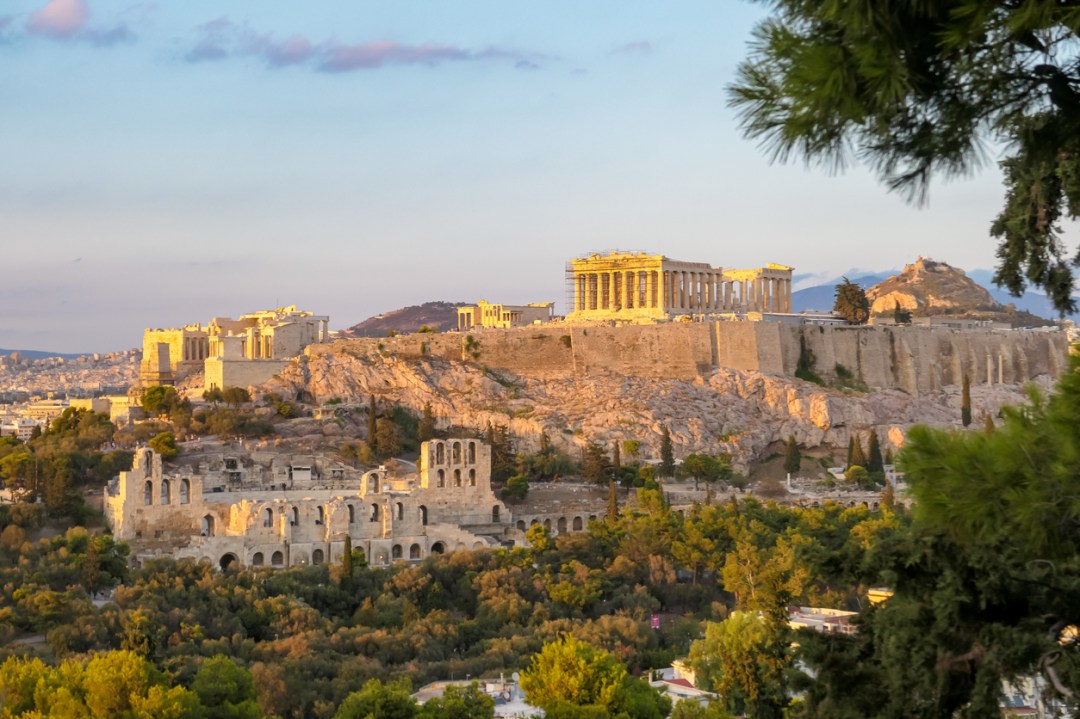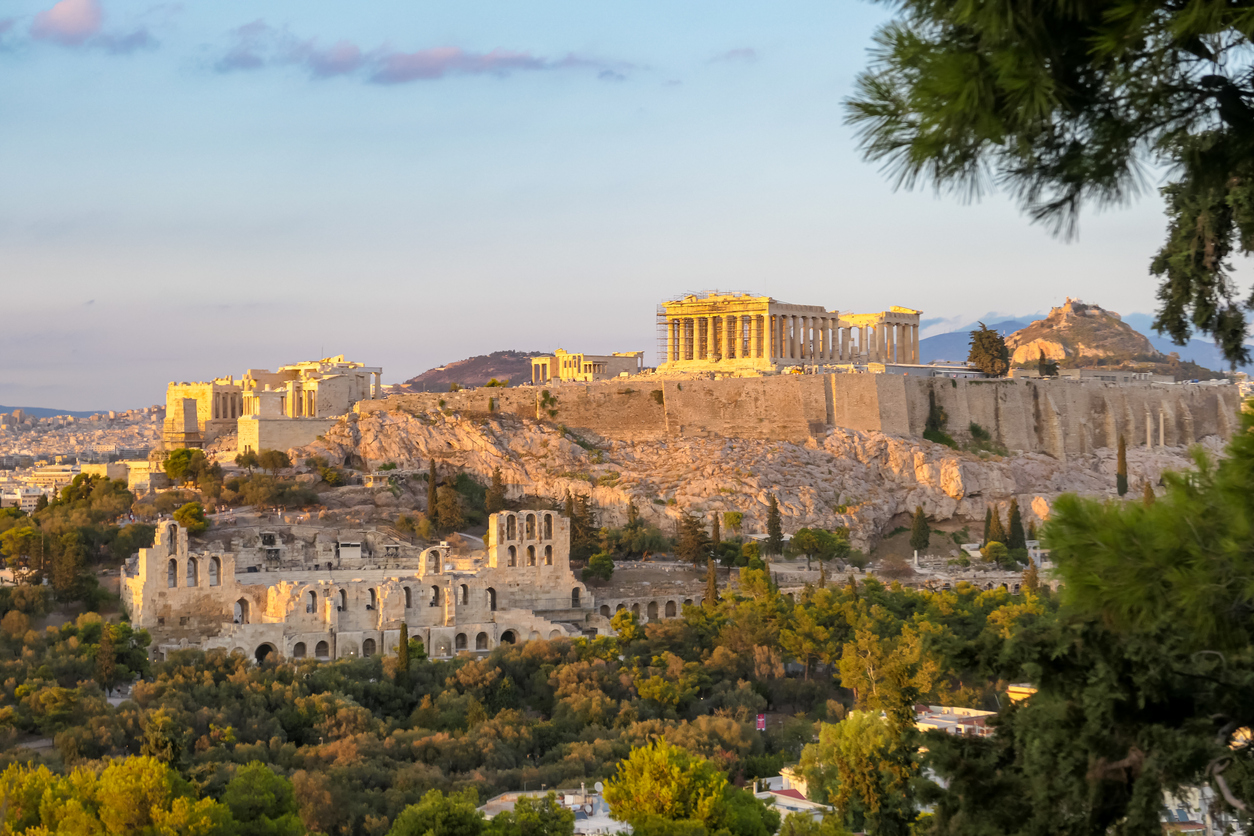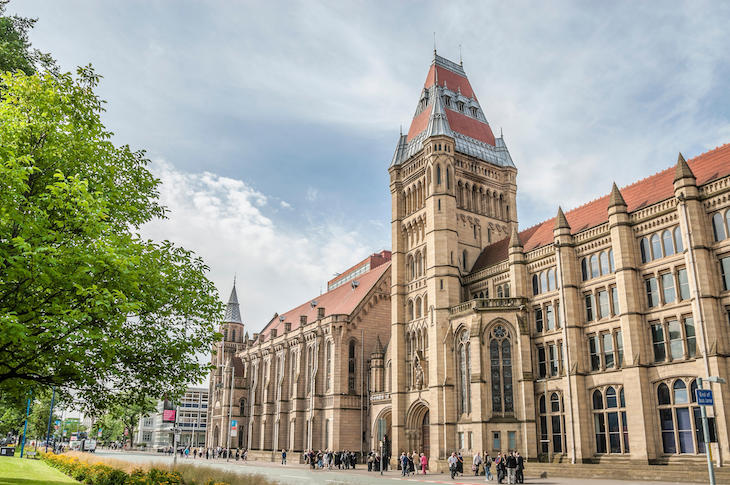I took my daughter to Athens for a short holiday at half-term. She is studying Ancient Greek at GCSE, which makes me immensely proud as I didn’t even get that far with Latin.
Delphi was wondrous but Mycenae was perhaps the most powerful: there is something about the place, as if one might close one’s eyes, touch the stone and travel back to the Age of Heroes. It is also salutary to ponder that this was once the largest city in Europe, just as Uruk, home to the written word, is now rubble.
There is a streak of romantic Hellenism that runs through the British ruling class
Yet the Parthenon, even though I’ve been before and it’s as crowded as Thermopylae on a bad day, is still magical, both up close and from a distance. It’s beautiful when lit up in the evening, and every time you catch it out of the corner of your eye, you feel a bit grateful.
There is, however, something missing from the great structure, a topic which our Greek tour guide managed to only bring up five times, which I felt very restrained – the Elgin Marbles. The Greeks have been pushing to get them back for years and now they might be in luck, as Keir Starmer’s government is said to be open to allowing the British Museum to loan them to Greece.
While legislation from 1963 makes it illegal for the Museum to permanently hand back the Marbles, part of the Parthenon Frieze, a loan would effectively be permanent – the Greeks would never hand them back again.
The British acquisition of the Marbles was controversial even at the time. In The Warm South, Robert Holland recalled how architect Robert Smirkewitnessed the removal of the frieze ‘and as the heavy stone, dislodge by crowbars, sashed against the ground, he recorded that “it seemed like a convulsive groan of the injured spirit of the Temple”’. Travel writer Edward Dodwell also described his ‘inexpressible mortification’ at observing the destruction and the ‘shattered desolation’ of the remaining Parthenon. Lord Byron, perhaps the most famous of British Hellenophiles, naturally considered Elgin’s actions to be vandalism and looting.
Many British people down the years have agreed, and public opinion is quitefirmly in favour of returning the Marbles, although I imagine that it’s not something many people care about that much. I tend to agree, although this is not something I have concrete views about; I wrote about this subject briefly, years ago, and have changed my mind more than once since; I will probably change my mind again tomorrow. What I think is all wrong is the tone, and that is why it may be unwise for the current government to be the ones handing them over, as looks increasingly likely.
I’m not in favour of giving back the Marbles because we’re a nation of imperialist looters and plunderers – quite the opposite. The British Museum has done an immense job in preserving the world’s heritage, and many of its items would have otherwise been destroyed.
In fact, the British have an unusual history of preserving things, as this thread by Sam Bidwell explains. ‘Objective study, cataloguing, and preservation is not the historical norm around the world,’ he writes: ‘Many now-famous sites were simply abandoned when they lost their original use.’
The British were the first to rediscover Ur, to properly study Petra, and uncovered ancient Amaravati Stupa in India. Arthur Evans discovered Knossos – and sort of ruined it. Many precious items are still with us only because the British took them, illustrated by the sad fate of the Mosul Museum, smashed up by ISIS in 2014 with immense loss to humanity. Similar tragedy befell Syria where Palmyra was destroyed, despite the courageous opposition of archaeologist Khaled al-Asaad. In London there is a small community of Assyrians, an Iraqi Christian minority who trace their descent to the ancient people of the same name, who are very attached to the British Museum and grateful that their heritage is safe here rather than in the old country; while their community has been destroyed in Iraq, they can still go and see what their ancestors built, and so will their children.
The British of the 18th and 19th century combined a huge sense of curiosity about the outside world with a high degree of social trust at home, one of the results of which was a sense that great objects of scientific or historical interest should be open to the public. When the British Museum opened in 1753, it was designed to be a ‘universal museum’, its collection bequeathed by Sir Hans Sloane ‘for the nation’.
As Bidwell wrote, this Museum was shaped by a number of unusual ideas not universally shared: ‘history as a “public good”, regardless of utility – preservation of history, rather than reconstruction or destruction – objective study of history as a craft – cataloguing, curating, and collecting.’
Sloane’s way of thinking is not shared everywhere, even now, something made clear with the Benin Bronzes, which were returned to Nigeria and went straight into a private collection. This was obviously predictable to anyone with the minimum amount of guile, but then one of the hallmarks of today’s notionally global-minded elite is an absence of curiosity about human cultures, in sharp contrast to the men who uncovered Petra or Ur.
Not every culture has a huge interest in museums as Sloane understood them, and low-trust societies are not diligent about museum pieces being available to everyone, nor in preserving items or keeping collections together. Cultures vary around the world; that is, in part, what makes them interesting.
If this became a precedent, it could be a disastrous one, which is why the tone and reasoning matters so much. Starmer’s government wants to hand back the Marbles because – I imagine – they are motivated by a deep sense of anti-colonialism, or at least anti-European colonialism. This isn’t a good reason to hand over priceless artefacts, will inevitably encourage further demands, and will entail handing them over to less-than-diligent new owners. This is why any return must come with a determined pushback against the idea that they were ‘looted’, but rather with a confident and indeed chauvinistic attitude to Britain’s past.
Instead it looks like the Marbles will be handed over by a weak and unpopular government, whose patriotism is suspected (to put it mildly), which already has a feeble foreign policy and lacks the self-confidence to kick back against future demands. Indeed, any return would be far more effective if carried out by a Right-wing government cruising on 50 per cent in the polls having just launched another aircraft carrier and deported their millionth illegal migrant. But it looks like we’re not going to get a popular, patriotic government with a strong foreign policy anytime soon.
Likewise, I am sceptical of former Europe minister Dennis MacShane’s argument that returning the Marbles would win us valuable allies on the continent; with the greatest respect to Greece, it is not hugely important in European politics and hasn’t been since around 1204. Neither is the belief that if you just give people what they demand from you, then they will like and aid you in future, very convincing. Strength is what matters in foreign affairs; but strength with magnanimity is incredibly powerful.
In fact, the only good reason to return the Marbles is that they belong to the Greek people, that nations are real, and their people have a shared patrimony.
The estimable Nigel Biggar recently made the case against returning the Marbles, by calling ‘The argument that the Marbles should be returned to Greece because they represent “the essence of Greekness” … nationalist nonsense. That essence is supposed to be democracy, and yet in the “democracy” that Periclean Athens supported when the Parthenon was built, 30,000 citizens elected representatives to the legislative assembly, which ruled over 300,000 unenfranchised women and slaves. That was far more like England’s medieval parliament than today’s democratic one. And whereas contemporary Greeks may project onto the Parthenon’s sculptures an embodiment of their own ideals, their original meaning to ancient Athenians was imperial triumph and to ancient Spartans and Corinthians, imperial oppression.’
He warned that this would lead to ‘opportunistic claims for reparations’ and against ‘politics that trashes your own country’s past and indulges another country’s nationalist fantasy’. He’s correct that it will lead to further claims, and it’s also a bad idea at this current moment because this government looks weak and gullible on the global stage after the Chagos Islands fiasco, not to mention the government’s weak response to an obvious shakedown over slavery reparations; the wallet inspectors turn up and they comply, because of ‘international law’ that no one else cares about.
But I’m not averse to some nationalist nonsense myself. The Marbles belong in Athens not because of their relevance to democracy, but because the Greeks are the heirs and descendants of the ancient Greeks who built them, and own them by right of ancestry.
There is another side to the pro-Bloomsbury argument, too. Former British Museum director Neil MacGregor previously defended the Marbles staying in London by saying that it is a ‘museum of the world, for the world’. That is true – but the implication of MacGregor’s argument was that, by extension, London belongs to the world, too. I know that the people who run Britain’s institutions are enthusiastic about such an idea, but I’m less so. Besides which, while people can always see the Marbles in London, they can always see them in Athens, too – it’s not exactly off the beaten track, it’s safe and friendly and full of tourists. Absolutely packed with them.
As things stand, the Greeks have offered to loan various antiquities in exchange, to occupy the room where the Marbles currently sit. A sensible government would say ‘no’ to this offer: this isn’t a trade, we’re not asking for anything in return, these are uniquely important items of national importance to you and, because we know how much it means, this is one-off gesture of goodwill and friendship to the Greek people. We’ve cared for them for two centuries, and we’re proud of what we’ve done.
Instead, the room where they are currently displayed should be turned into an education centre, telling the story of how the British Museum preserved and saved so much of humanity’s heritage; how humanity owes the Museum a debt of gratitude. Again, just as my scenario assumes a government that is pro-British and popular, this assumes a parallel universe bizarro-world where British institutions are run by people unashamedly proud of the country and prepared to stand up for its history.
There is a streak of romantic Hellenism that runs through the British ruling class, and which reached its apogee in the public schools that sacrificed so many of their best men in Flanders. MacShane quoted Byron, England’s greatest Hellenophile, and Paddy Leigh Fermor, dropped into Crete where he recited the classics with his German captor, recalling that ‘We had both drunk at the same fountains long before.’
This is in my own family, too, which is what delights me that my daughter has caught the Greek bug. My great-grandfather, Walter Leaf, was a classicist who translated Homer’s Iliad and other works in his spare time, and was friends with Arthur Evans. He later succeeded Evans as president of the Hellenic Society and I like to think that he was looking down with a smile as his descendants walked the same paths.
Yet, of course, that Hellenophilia was a LARP for many. As Robert Holland wrote, when Lady Blessington spoke about her life much later, she said of Byron that ‘On one thing those who knew him were in no doubt. He was not doing it for the Greeks.’
Likewise, Shelley had declared that ‘We are all Greeks’ but ‘this was in the vein of that Intellectual Beauty which was his only tangible belief; the declaration had to do with universal mind and spirit, not actual events’. When an actual Greek politician, Alexandros Mavrocordatos, turned up at the Shelley house, he was treated coldly. I can absolutely imagine Shelley’s stated and revealed life preferences today, even down to the London postcodes he’d choose and the placards displayed from the window.
Many British visitors were also deeply disappointed by what they found in Greece. In 1858 future prime minister William Gladstone had been appointed as high commissioner extraordinary to the Ionian Islands by Edward Bulwer-Lytton, colonial secretary to Lord Derby’s Conservative government, because he had written Homer and the Homeric Age, which obviously made him just the man to run a modern day colonial province. He left three months later, disillusioned and fed up ‘with the Greeks in general and the Ionians in particular’, as he put it. He never stopped loving Homer, however.
Many felt a crushing disappointment about the real-life descendants of the people of Socrates, Plato and Aristotle, and how far they had fallen from greatness. Perhaps the feeling haunted them, at the time of Palmerston’s gunboat diplomacy and Britain’s greatest strength, that one day the same would be thought and said of their own posterity: that they might become a weak and easily humiliated people, pushed around and scorned. As the great poet of empire put it:
Far-called, our navies melt away;
On dune and headland sinks the fire:
Lo, all our pomp of yesterday
Is one with Nineveh and Tyre!
This article first appeared in Ed West's Wrong Side of History Substack,









Comments